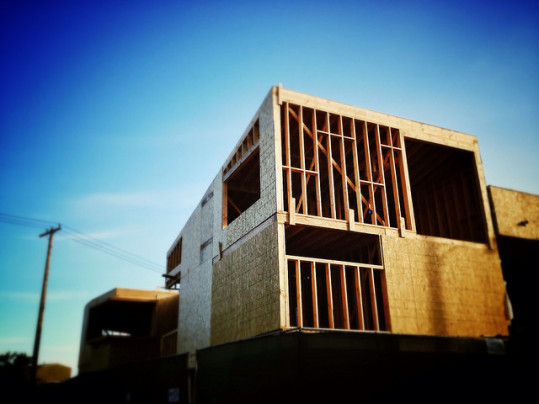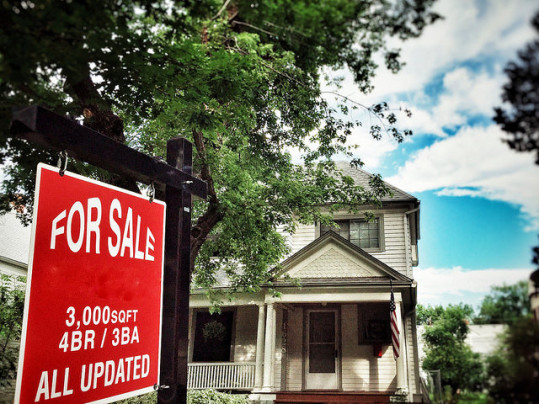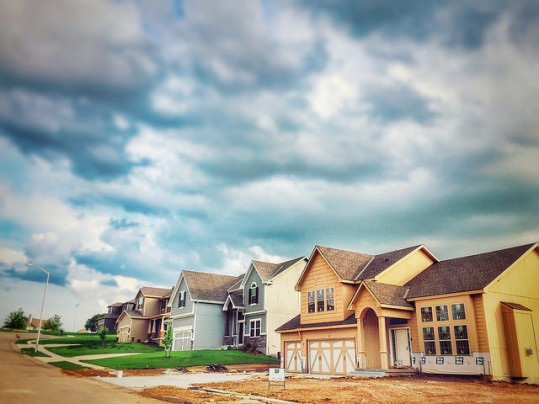The National Association of Home Builders conducts a monthly survey to measure how confident builders are in the market for newly built, single-family homes. After all, if builders – whose livelihood depends on selling new homes – are optimistic about the market, chances are good that conditions are favorable for buyers too. According to the most recent results, builder sentiment over the past three months has been higher than at any time since December 2017. In fact, February’s results scored a 74 on a scale where any number above 50 indicates more builders feel conditions are good than poor. Dean Mon, NAHB’s chairman, says there are a number of positive factors that are keeping builders optimistic, but there are some lingering challenges as well. “Steady job growth, rising wages, and low interest rates are fueling demand but builders are still grappling with increasing construction and development costs,” Mon said. Those increasing costs make it challenging for builders to build affordable new homes, which are important right now since there are fewer entry-level homes available for sale in many markets. Still, a high level of optimism from home builders is a good sign for the 2020 housing market. (source)
Archive for February 2020
The Top Things Home Buying Couples Argue About
Like any big decision, buying a home requires a lot of thought and consideration. You have to figure out what you want, what you need, and what you can do without. But, if you’re buying a home as a couple, you also need to compromise with your significant other. Because, chances are, the two of you will have some different ideas when it comes to the type of home to buy, the features you have to have, the neighborhood you’d like to live in, and the amount you’d like to spend. In fact, a recent survey found 77 percent of couples who bought a home together in the past decade argued during the home buying process. But what were the most common squabbles? Well, 54 percent said they argued over what style or size of home they should buy, while 47 percent of respondents said they argued over what their dealbreakers were. Fewer participants named the neighborhood as a point of contention, while others said they argued about the budget, whether to buy a fixer-upper, or mortgage options. Whatever the case, it’s clear that most couples will face some disagreements while going through the buying process. The good news is it’ll get better. Survey results show fewer baby-boomer couples reported arguing than younger couples did. (source)
Where You Work Affects Where You Buy
Fantasizing is a big part of shopping for a home – whether you’re dreaming of a big kitchen, a beautiful backyard, or tons of storage space. Every home shopper has, if not a dream house, at the very least, some features they’re dreaming about having in their next home. And, according to one recent survey, there’s one feature that most of us share. That’s a quick commute to work or school. In fact, about 62 percent of home shoppers said their commute was extremely important when deciding where to buy. If you’ve ever sat in stand-still traffic after a long day at work, you know why. Spending time sitting in traffic when you’d prefer to be at home relaxing or enjoying time with your family can be frustrating. So it’s no surprise that buyers, renters, sellers, and owners all agree they want to spend no more than 30 minutes commuting to work. Some even said they’d go no further than 15 minutes. On the other end, just 12 percent said they’d consider driving 45 minutes to an hour and an equal amount said they wouldn’t mind driving an hour or more. (source)
Purchase Demand Has Best January Since 2009
According to the Mortgage Bankers Association’s Weekly Applications Survey, demand for mortgage applications was up last week. But though most of the improvement was refinance activity, purchase demand is still higher than last year at the same time. In fact, demand for loans to buy homes is now 16 percent higher than one year ago. Joel Kan, MBA’s associate vice president of economic and industry forecasting, said it was the best January since 2009. “Last month was the strongest January for purchase applications since 2009, which is perhaps a sign that mild weather brought out prospective buyers earlier than normal,” Kan said. It could also be mortgage rates. The survey found average rates up from the week before but still near lows last seen in 2016. That, combined with slower price increases and a mild winter, has buyer interest growing weeks ahead of the typical spring sales boom. The MBA’s survey has been conducted weekly since 1990 and covers 75 percent of all retail residential mortgage applications. (source)
What Should You Do If You Can’t Find A Home?
In markets where there are fewer homes for sale, prospective home buyers might have to look around a while before they find a home that fits their lifestyle and checks off the right boxes on their wishlist. This can be frustrating. But, if you know what to expect and have a plan to deal with it, it doesn’t have to be. So what do buyers who have been looking a while do when they can’t find a home that works? Well, according to one recent survey from the National Association of Home Builders, the majority of buyers say they practice patience. In fact, 51 percent of respondents said they’d just continue looking for the right home in the same location. If you’ve run out of patience, however, you can also try looking in a different neighborhood. Expanding your search area will give you more options and you may stumble upon a neighborhood you hadn’t consider that ends up being a perfect fit. Other survey participants said they’d be willing to look at smaller or older homes, though only 19 percent said so. Still, rethinking your list of must haves and dealbreakers can help you see your current options in a different light. Finally, 16 percent said they’d up their budget and look at more expensive homes, which is a fine strategy if you can afford it. (source)
Can Homes For Sale Keep Up With Demand?
For the past few years, inventory has been the main issue affecting housing market conditions. Many markets had fewer homes for sale than normal and that meant higher prices and more competition among interested home buyers. Then, last year, there was improvement. Inventory started to climb again, price increases began to slow, and sales rose. Combined with declining mortgage rates, conditions were better balanced than they’d been in a while. So how does for-sale inventory look so far this year? Well, according to newly released numbers from the National Association of Realtors’ consumer website, the number of homes for sale has started to decline again. In fact, year-over-year, there were 164,000 fewer homes for sale across the country in January. That could mean a more competitive spring for home buyers. Of course, the conditions you’ll find if you’re shopping for a house will largely depend on where you’re shopping. For example, while homes for sale sold faster in cities like Oklahoma City, Hartford, and Raleigh, they were selling more slowly in Las Vegas, Boston, and Detroit. (source)
Americans Are Optimistic About Housing Market
Each month, Fannie Mae’s Home Purchase Sentiment Index measures Americans’ feelings about the housing market, the economy, and their personal finances. Survey participants weigh in on their expectations for mortgage rates, home prices, their job security, income, and whether or not they think it’s a good or bad time to buy or sell a home. In January, sentiment rose for the third consecutive month, moving the index closer to an all-time survey high. Put simply, Americans are feeling optimistic and a lot of it is due to an expectation that mortgage rates will stay low for the foreseeable future. Doug Duncan, Fannie Mae’s senior vice president and chief economist, says the outlook is good. “Low rates continue to be a key driver of consumer optimism about both current home buying and home-selling conditions,” Duncan said. “Favorable views on job security and personal financial expectations reflect the strength of the labor market, which we believe will continue to bolster housing demand.” Survey results show 59 percent of respondents say it’s a good time to buy a home and 66 percent say it’s a good time to sell. (source)







